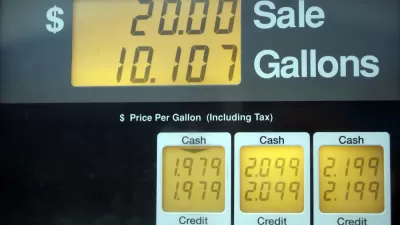To the chagrin of many state legislators, Gov. Terry Branstad opposes new revenue measures to fund transportation projects, as he believes he is following the wishes of his constituents. Tax cuts, not increases, are on his agenda.
Pointing to the current gas price spikes in the Midwest, Gov. Branstad asserted that "public support for a gas tax increase has evaporate(d)". He suggested two alternatives revenue measures "to fund critical road and bridge upgrades in the future", writes Rod Boshart.
- State gambling profits, and
- A dedicated share of the state sales tax.
Indeed, the highest gas prices in the U.S. are in the Midwest due to "refineries undergoing maintenance", according to Reuters.
“I think the idea of year after year coming back and saying we’ve got to raise the gas tax [last increased in 1989] when the public is strongly opposed to it doesn’t make a lot of sense,” added Branstad. He said he is not looking to increase any tax or fee, but he ruled out collecting tolls on roadways as an option.
For those who think that the road construction lobby is all-powerful, think again.
“I think (road-construction interests) have to come to the realization that they don’t have public support to raise the gas tax and it’s probably not going to happen in an election year,” he said.
Branstad directed "Department of Transportation Director Paul Trombino III and other interested groups to 'think outside the box' and come up with new ideas for financing the construction and maintenance of Iowa’s road system."
In fact, tax cuts, not increases, appear to be occupying the governor, who "said he hoped to build on a tax-policy compromise he will sign into law next week that provides the largest tax cut in state history, saying more property and income tax relief is needed..."; adding, "I think it’s very likely we’ll be looking at reducing the income tax further in the 2014 legislative session." Boshart noted that while Branstad hadn't decided on whether to run for "an unprecedented sixth term...(he) sounded very much like a candidate during Friday’s interview".
Not all politicians are as convinced of the public's opposition to increasing gas taxes.
James Q. Lynch writes in the Mason City Globe Gazette that Senate Appropriations Committee Chairman Bob Dvorsky stated "(t)here was a 'boomlet' of support for increasing the gas tax for the first time in 24 years. He thought there were enough votes in the Senate, but support evaporated in the House."
Reinforcing the bi-partisan nature of increasing gas taxes to pay for needed transportation projects, Rep. Bobby Kaufmann, R-Wilton, stated, “I know there were a lot of unhappy people that a fuel tax didn’t pass this year. The illusion we were given was that if we had property tax reform that a gas tax would be approved.”
“We had the votes,” Kaufmann insisted.
FULL STORY: Branstad: Alternatives needed to gas tax increase

Planetizen Federal Action Tracker
A weekly monitor of how Trump’s orders and actions are impacting planners and planning in America.

Congressman Proposes Bill to Rename DC Metro “Trump Train”
The Make Autorail Great Again Act would withhold federal funding to the system until the Washington Metropolitan Area Transit Authority (WMATA), rebrands as the Washington Metropolitan Authority for Greater Access (WMAGA).

The Simple Legislative Tool Transforming Vacant Downtowns
In California, Michigan and Georgia, an easy win is bringing dollars — and delight — back to city centers.

The States Losing Rural Delivery Rooms at an Alarming Pace
In some states, as few as 9% of rural hospitals still deliver babies. As a result, rising pre-term births, no adequate pre-term care and "harrowing" close calls are a growing reality.

The Small South Asian Republic Going all in on EVs
Thanks to one simple policy change less than five years ago, 65% of new cars in this Himalayan country are now electric.

DC Backpedals on Bike Lane Protection, Swaps Barriers for Paint
Citing aesthetic concerns, the city is removing the concrete barriers and flexposts that once separated Arizona Avenue cyclists from motor vehicles.
Urban Design for Planners 1: Software Tools
This six-course series explores essential urban design concepts using open source software and equips planners with the tools they need to participate fully in the urban design process.
Planning for Universal Design
Learn the tools for implementing Universal Design in planning regulations.
Smith Gee Studio
City of Charlotte
City of Camden Redevelopment Agency
City of Astoria
Transportation Research & Education Center (TREC) at Portland State University
US High Speed Rail Association
City of Camden Redevelopment Agency
Municipality of Princeton (NJ)




























